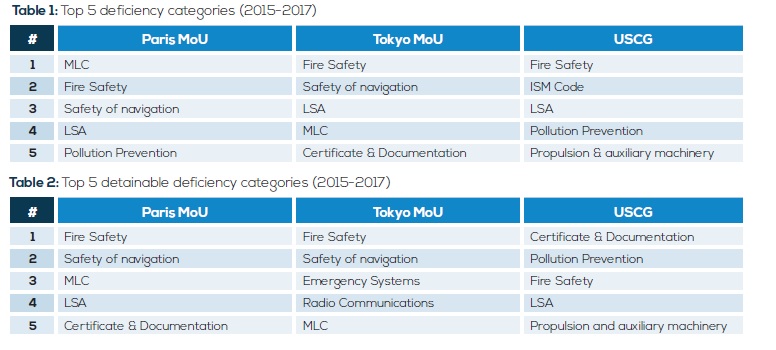A PSC inspection resulting to useful case studies and/ or lessons learned for ship operators, aims to pave the way for improvement. The global PSC system includes many different regions (9 MoUs and USCG), facilitating PSCOs to shed their focus on different levels of PSC and sub-standard items all over the world.
Taking into consideration the combined data of last three years of PSC results, Tables 1,2 present the top 5 deficiency categories and the top 5 detainable deficiency categories respectively within Paris, Tokyo MOU and USCG.

Fire Safety
This deficiency category includes a large number of items, equipment and procedures. The SOLAS maintenance procedure as well as weekly, monthly, quarterly and annual inspections aim to protect vessels from such deficiencies. Realistic drills may assist in crew familiarization with the use and handling of equipment along with the required supervision over equipment condition. Delays on inspection and overdue dates to portable and installed firefighting equipment are not considered as good practices by PSCOs with respect to fire safety onboard.
Life Saving Appliances
Same as above, the related SOLAS maintenance procedure provides an excellent guide for inspection and compliance. Special care should be taken to condition and operational status of equipment. Lifeboats, life rafts and means of their deployment are subject to inspection and thus noncompliance often leads to detentions. What is more, the engines of lifeboats should be closed monitored and inspected not only for PSC compliance but also as a critical item for saving lives.
Safety of Navigation
ECDIS is considered as a useful tool for navigation purposes, while at the same time, it is vulnerable during PSC inspections for deficiencies. Apart from the equipment operational status (radars, compasses, VDR, BWNAS, AIS, Satellite positioning systems, Steering gear etc), familiarity with ECDIS navigation is one of the areas requiring increased focus. Therefore, OOWs should be able to demonstrate skills of understanding how to use safety parameters (safety contour, safety depth, anti-collision cone etc), alarms follow up and passage plan implementation. Additionally, high attention is required to the status of chart condition and update procedure.
Certificate & Documentation
All inspections start with certification review and status. Overdue dates lead to clear grounds for detailed inspection. The safest way not to be involved in such situation is to establish an office review procedure for all managed fleet, through which all on board certificates will be monitored and actions for renewal or replacement will be implemented effectively and on time.
In this category, the general record keeping for important documents on board is often found as a deficiency. However, it depends on each PSCO whether it may be included in this category or in document category of relevance (eg ORB may be marked as a Pollution prevention deviation).
Proper record and log keeping may be achieved through training and guidance from the organization. Therefore, Internal Auditors and/or superintendents during their visits on board should thoroughly review and inspect documentation in order to correct gaps and provide guidance for the required entries.
Pollution Prevention
All environmental items are considered to be very important during a PSC inspection. Status of equipment (OWS, Incinerator, ODME, BWTS, sewage etc) combined with compliance for discharges and emissions are challenging issues that may lead to deficiencies and probably to detentions.
The introduction of environmental equipment into a critical list makes the maintenance and increased operational status priority in order to avoid sudden defects. Detailed and strict compliance with legislative requirements for discharges and emissions may also assist. Extended training and familiarization program is essential for implementation during the operation of equipment (especially for OWS and BWTS) from all involved personnel.
MLC
Organizations are required to implement working & living conditions on board as per MLC requirements. Notably, there are several PSC authorities which provide specific guidance to their officers for MLC inspections (such as Paris MoU and AMSA). These requirements have two aspects of compliance with regards to documentation and conditions. In particular,
- Documentation includes manning agreements, seafarer’s agreements, work & rest hours and complaints. A detailed review is required to accomplish the above requirements based on inspections from the manning agency while a Seafarers Employment Agreement, supported by a procedure to cross check for gaps and missing items, is vital. Also, a working arrangement table to be placed on onboard and updated as necessary, is considered as a good indicator for compliance. This should be supported by documented evidence for each crew member’s work &rest hours status as per MLC & STCW requirements. Posters indicating the contact details for complaint and the handover of a copy of procedure to each seafarer also provide additional compliance evidence. Lastly, each on board complaint should be followed up as required in accordance with MLC manual.
- Condition status refers to the working & living conditions. Working conditions should be supported by adequate Health & Safety procedures while procedures for cleanliness and inspections reflect to living conditions. Additionally good cleanliness status of galley and provision stores indicates MLC compliance.
Propulsion & Auxiliary machinery
These types of deficiencies are mainly found due to inadequate maintenance. Therefore, the maintenance procedure as described within SMS and other supportive documentation should be followed. Additionally, cleanliness and the implementation of best practices in Engine room and other spaces make a good impression to PSCOs during inspections.
ISM Code
This type of deficiencies often summarize most of the above deficiencies. It is one of the “No Go Items” for a company to be not in compliance with ISM; the status of deficiencies related to ISM leads to additional audits from Flag or/and RO side. Therefore, detailed and comprehensive audits on board by experienced personnel may assist to prevent such deficiencies.































































